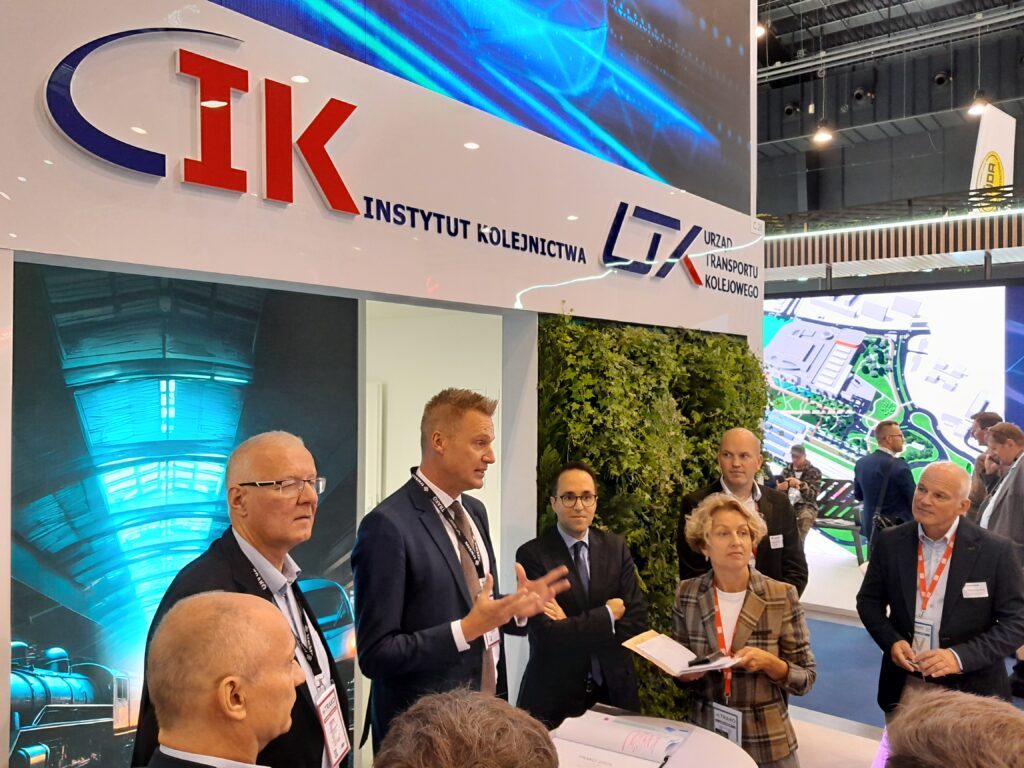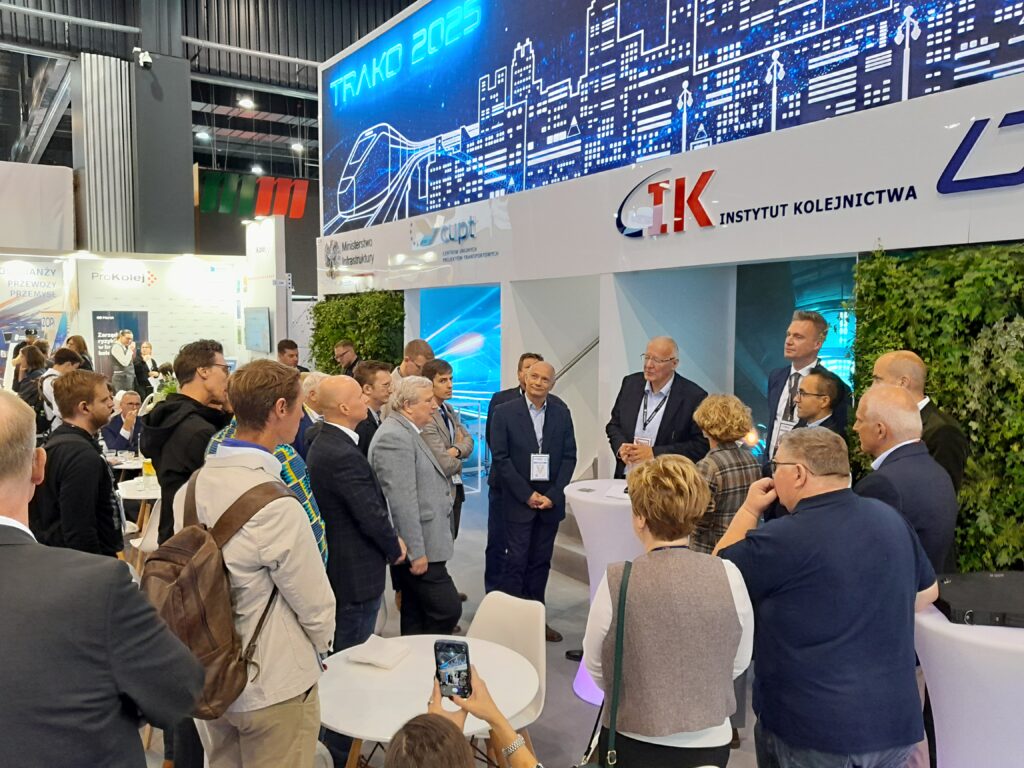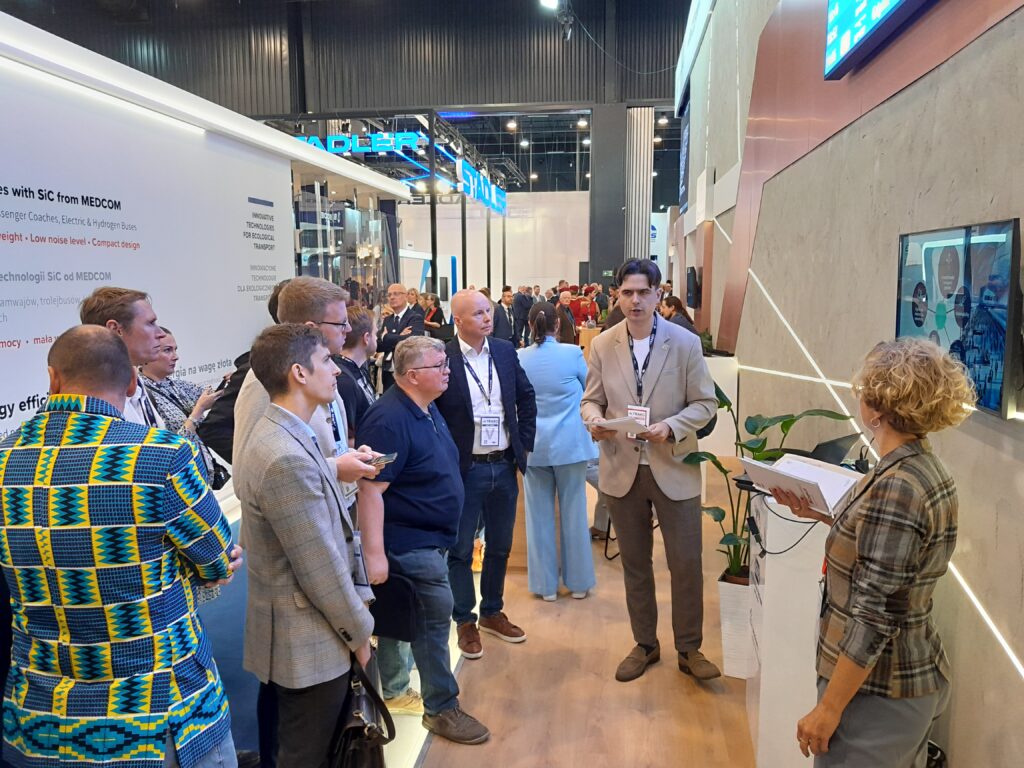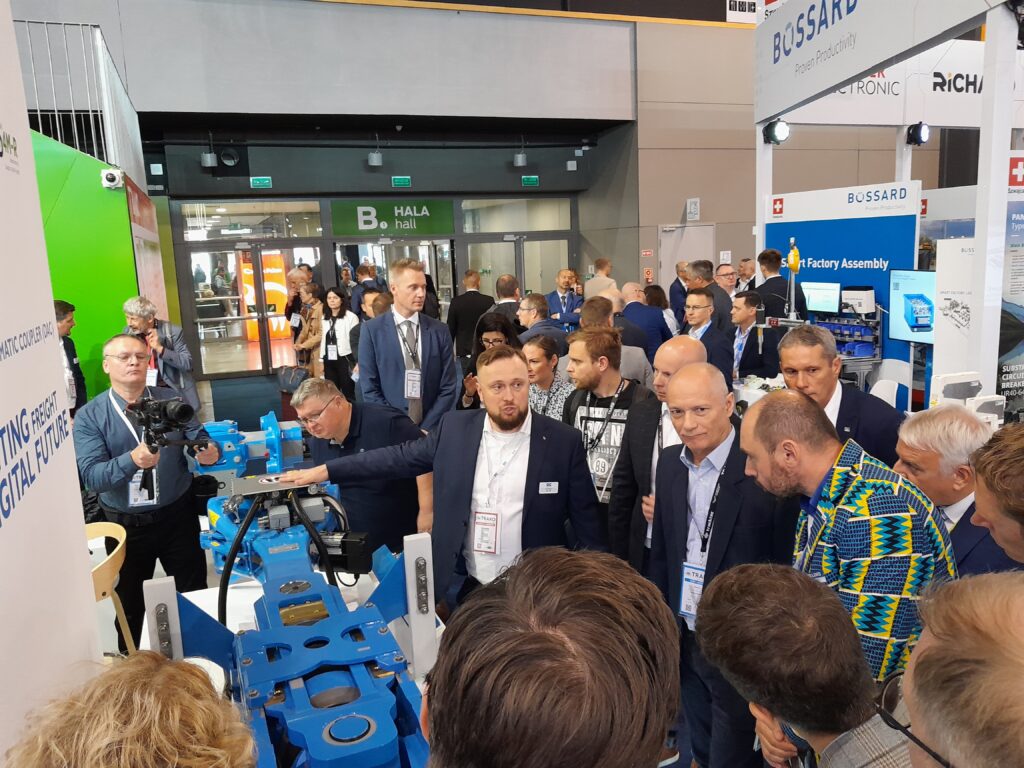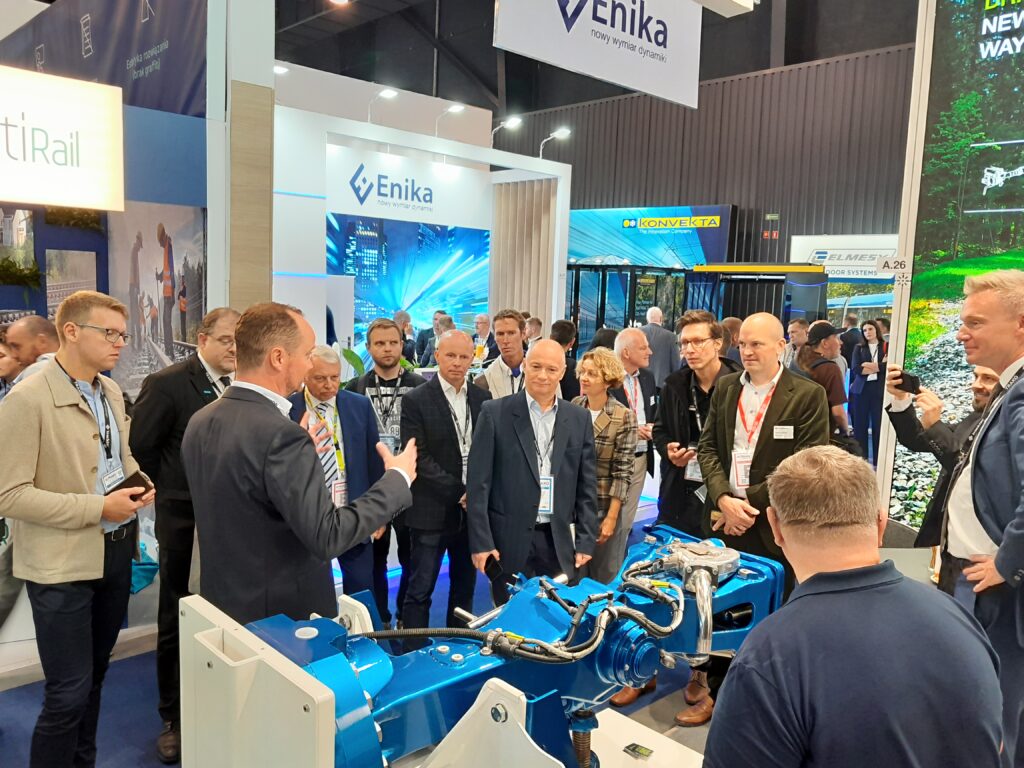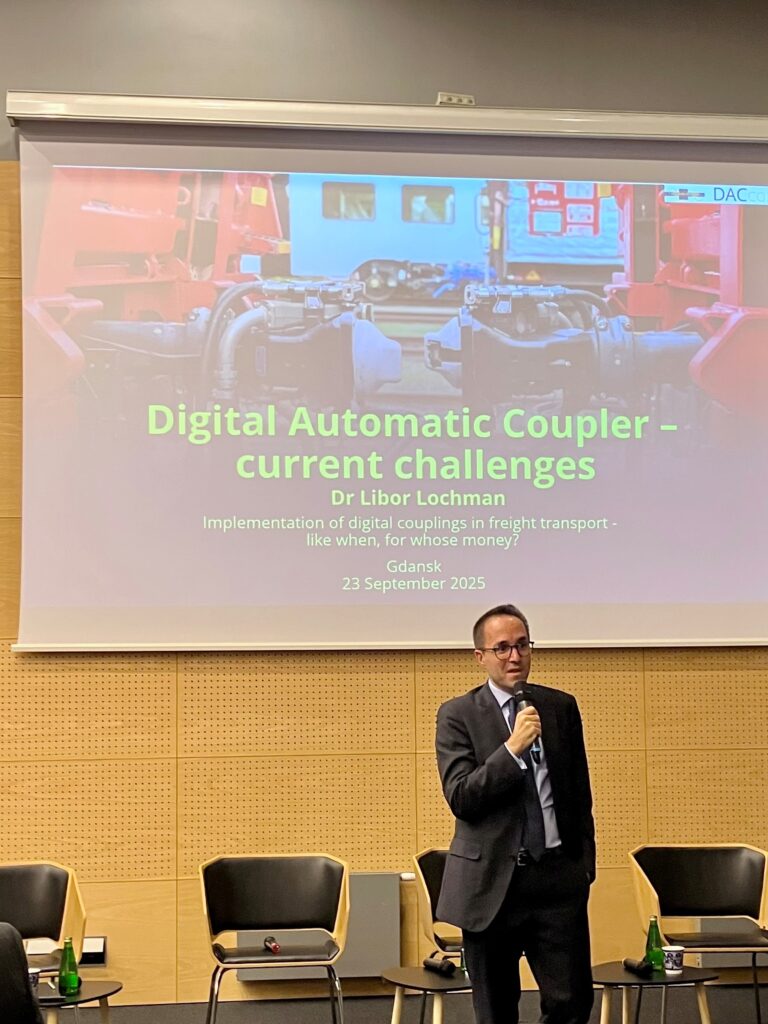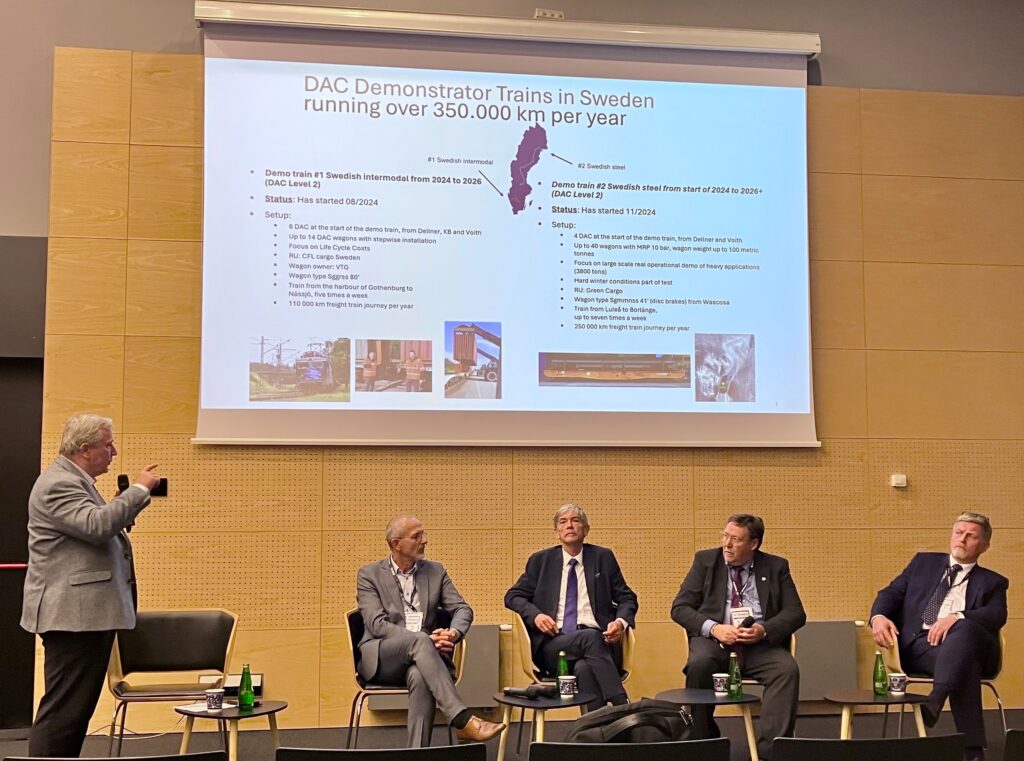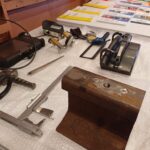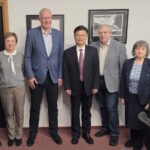Międzynarodowe Targi Kolejowe TRAKO 2025 (największe targi kolejowe w Europie Środkowo-Wschodniej i drugie co do wielkości na kontynencie) przeszły do historii. Tegoroczna edycja pobiła nowe rekordy – blisko 700 wystawców i ponad 23 000 odwiedzających z 54 krajów.
TRAKO to miejsce prezentacji innowacyjnych rozwiązań dla kolei. Podczas targów zaprezentowano również najnowsze osiągnięcia w zakresie wdrażania cyfrowego automatycznego sprzęgu w Europie. Poniżej znajduje się pełne podsumowanie przebiegu wydarzenia.
Pierwszy dzień targów był okazją do spotkania ekspertów DAC z różnych firm zaangażowanych w europejski program DAC Delivery Programme oraz europejskie projekty kolejowe FP5-TRANS4M-R, DACFIT i FP5DACtiVate. Byli oni gotowi odpowiadać na pytania publiczności na stoiskach Instytutu Kolejnictwa, Grupy PKP, DB Systemtechnik (w tym DB Cargo i DB Group), Dellner – Train Connection Systems oraz Voith Turbo. Podczas spotkania „Meet the DAC Experts” eksperci mieli okazję poruszyć szeroki zakres aspektów projektu DAC – od technologii i eksploatacji, przez autoryzacje, po przygotowania do migracji.
Następnie z przewodnikiem DAC Tour zorganizowano zwiedzanie pod przewodnictwem European DAC Delivery Programme i wsparciu Europe’s Rail oraz projektów FP5-TRANS4M-R, DACFIT and FP5-DACtiVate. Prawie 30 uczestników zostało oprowadzonych po różnych stacjach, uzyskując kompleksowy przegląd działań DAC w Europie. Zwiedzanie rozpoczęło się od krótkiego wprowadzenia Nicolasa Furio, Dyrektora ds. Innowacji w Europe’s Rail, oraz Enno Wiebe, Dyrektora Wykonawczego UNIFE, reprezentującego europejski sektor przemysłu kolejowego. Następnie Instytut Kolejnictwa przedstawił swoją rolę w projekcie DACFIT oraz sam projekt. Projekt FP5-DACtiVate i działania PKP w jego ramach zostały zaprezentowane na stoisku Grupy PKP. Na koniec producenci DAC, Dellner – Train Connection Systems i Voith Turbo, zaprezentowali swoje produkty – cyfrowy sprzęg automatyczny i sprzęg hybrydowy.
Ożywiona wymiana poglądów i pomysłów po trasie DAC była kontynuowana podczas dyskusji panelowej DAC, która zakończyła działania DAC tego dnia na TRAKO 2025. Panel zorganizowany przez Instytut Kolejnictwa i Izbę Gospodarczą Transportu Lądowego zgromadził zarówno zwolenników, jak i sceptyków DAC, aby omówić zalety, a także wyzwania związane z wdrożeniem DAC i jego wpływ na transport towarowy. Szef Filaru Innowacji, Nicolas Furio, otworzył sesję przemówieniem wstępnym. Dalsza dyskusja dotyczyła postępów we wdrażaniu DAC i wprowadzeniu PioDAC, europejskich strategii migracyjnych i potencjalnych wyzwań okresu przejściowego. Debatę poprowadził prof. Marek Pawlik – zastępca dyrektora ds. interoperacyjności kolei z Instytutu Kolejnictwa. Panelistami byli: Libor Lochman z EDDP, Jan Bergstrand z Trafikverket, Zbigniew Jancewicz z Grupy PKP i Mirosław Szczelina z IGTL. Podczas debaty szczegółowo omówiono aktualną sytuację w zakresie DAC oraz udzielano odpowiedzi na wszystkie (niekoniecznie łatwe) pytania.
———————-
The 2025 TRAKO International Railway Fair is history. From September 23rd to 26th, Gdańsk in Poland was Europe’s railway heart. The event is considered the largest railway fair in Central and Eastern Europe and the second largest on the continent. New records were set at this year’s edition with nearly 700 exhibitors and over 23,000 visitors from 54 countries.
TRAKO is a place to exhibit innovative solutions for railways.
The event also showcased the latest achievements in the rollout of the Digital Automatic Coupling in Europe. Please, find below a full summary of the course of the event.
The first day of the fair was an opportunity to meet DAC experts of different companies involved in the European DAC Delivery Programme and the Europe’s Rail projects FP5-TRANS4M-R, DACFIT and FP5DACtiVate. They were ready to answer questions from the public at the booths of Instytut Kolejnictwa, PKP Group, DB Systemtechnik (incl. DB Cargo and DB Group), Dellner – Train Connection Systems, and Voith Turbo. During “Meet the DAC Experts” the experts were able to cover a wide range of aspects of the DAC project – from Technology and Operation through Authorisation to Migration preparation.
Later that day, we proceeded with the Guided DAC Tour organised by the European DAC Delivery Programme with support of Europe’s Rail and again the projects FP5-TRANS4M-R, DACFIT and FP5-DACtiVate. Nearly 30 participants were guided through various stations, getting a comprehensive overview of DAC activities across Europe. The tour started with a brief introduction by Nicolas Furio, Head of Innovation Pillar of Europ’s Rail and Enno Wiebe, the Executive Director of UNIFE, representing the European rail supply industry. Instytut Kolejnictwa continued, presenting its role in the DACFIT project and the project itself. FP5-DACtiVate project and PKP activities within it were presented next at the booth of PKP Group. And finally, DAC manufacturers, Dellner – Train Connection Systems and Voith Turbo, presented in turn their products – digital automatic coupler and hybrid coupler.
The lively networking and exchange of views and ideas following the DAC tour continued during the DAC Panel Discussion, which rounded off the DAC activities on that day at TRAKO 2025. The panel organised by Instytut Kolejnictwa and Izba Gospodarcza Transportu Lądowego, brought together both DAC proponents and sceptics to discuss the advantages as well as challenges of DAC implementing and its implications for freight transport. The Head of Innovation Pillar, Nicolas Furio, opened the session with the introductory remarks. Further discussion included issues of progress in DAC implementation and PioDAC introduction, European migration strategies and the possible challenges of the transition period. The debate was moderated by Prof. Marek Pawlik, Deputy Director for Railway Interoperability at the Railway Institute. The panelists were: Libor Lochman from EDDP, Jan Bergstrand from Trafikverket, Zbigniew Jancewicz from PKP Group and Mirosław Szczelina from IGTL.
During the debate, the current situation regarding the DAC was discussed in detail and all questions (that were not necessarily easy) were answered.
